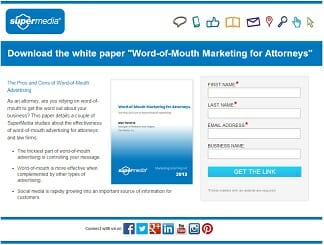
Word-of-mouth can be your best friend if the message is positive, but it can become a nightmare if someone has had a bad experience. Try this: go to Google, type in “I hate,” and follow it up with any large company name you can think of. You’re almost certain to get a website or Facebook page that explains why that company is despised. Now imagine if that were your company…
There are not a lot of ways to control the message through word-of-mouth. Clients can’t be expected to announce your tag line every time they recommend you. They may not even know what services you offer and thus recommend you to the wrong types of clients, which can end up being a waste of valuable time. Depending on how the message is sent (e.g., social media), a firm may be able to react to criticism and prevent damage, but that’s only if the message is seen. To know what’s being said, you need to be actively searching for comments made about you or your firm.
Word-of-mouth should be seen as a valuable tool in your tool chest, but it is not a panacea that will answer all your advertising needs. It can work for you and it can work against you, but in either case, you will want potential clients to find you in other ways too. Not everyone has a friend who has used an attorney; even those that have are most likely going to look for additional information about your firm before they make a decision.

Download our free white paper to find out more about more about the pros and cons of word-of-mouth marketing. Word-of-Mouth Marketing for Attorneys: The Pros and Cons of Word-of-Mouth Advertising, A Market Intel Report from SuperMedia.


